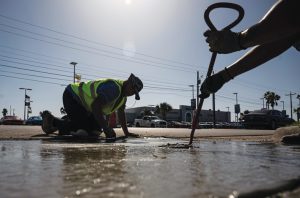BLOOMBERG
Every morning, thousands of construction workers in Qatar start their day by soaking their uniforms in water. The two-minute ritual kickstarts an important process: When the workers are toiling outside — often at summer temperatures above 120F (48C) — their uniforms can cool skin temperature by as much as 8C (14F), for up to seven hours.
The uniforms are made by British startup Techniche UK, which brands them as StayQool suits. Constructed from an outer layer of specially designed mesh, plus a waterproof inside layer, the suits absorb and remove heat through evaporation. They’re also adjustable: Workers can add or remove a cooling collar or wrist cuff as needed.
Techniche isn’t alone in seeing opportunity in apparel designed to beat the heat. With 2023 on track to be the hottest year on record, a number of startups are exploring new technologies and textiles for keeping people cool.
In the US, work is underway to commercialise wearable technology that mimics air-conditioning, while scientists in China are working on highly reflective fabric. With more heat and more heat waves expected in the years ahead, cooling is becoming a holy grail for garment makers.
“As climate change pushes temperatures in extreme directions, demand from consumers for cooling apparel is also increasing at a faster pace,” says Sophie Bakalar, a partner at venture firm Collaborative Fund, which invests in climate-friendly apparel startups.
“This trend is likely to continue as the Global South industrialises further and consumers have greater disposable income to spend on comfort.”
Extreme heat isn’t just inconvenient — it’s bad for human health, and the economy. Heat stress is particularly dangerous for children and the elderly, and can exacerbate existing medical conditions.
Productivity also takes a hit. In 2021, heat exposure nixed 470 million potential labour hours globally in agriculture, construction, manufacturing and the service industry, according to data compiled by The Lancet.
In the US, President Joe Biden has said heat waves cost the country $100 billion annually.
Research shows that heat waves are likely to become more frequent in coming decades. For companies like Techniche, that’s a recipe for growth.
Today, the startup sells vests, hats, neck bands and other garments with built-in cooling technology to companies and individual customers in nearly 30 countries.
 The Gulf Time Newspaper One of the finest business newspapers in the UAE brought to you by our professional writers and editors.
The Gulf Time Newspaper One of the finest business newspapers in the UAE brought to you by our professional writers and editors.
